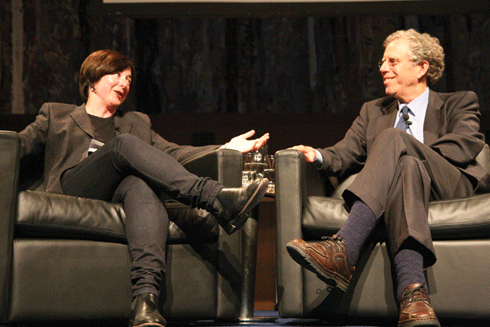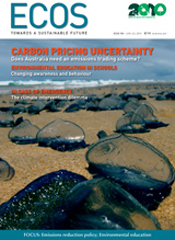
|
Published:
Business calls for rethink on climate change policy
Could the Gold Coast and its fast-growing population weather a major cyclone and storm surge ripping through its beachside high-rise and canal developments? Not in the near future, was the consensus of a panel of experts – from government, CSIRO, and the insurance and development sectors – at the recent 11th National Business Leaders Forum on Sustainable Development (NBLF).
During the lively ‘hypothetical’, ABC Senior Journalist, Fran Kelly, probed the expert panel on the tangle of issues – such as new building regulation and retrofits, land development, infrastructure protection, insurance and liability, and community preparedness -– that need addressing if communities along the Gold Coast are to survive the impacts of more southerly, intense cyclone events predicted for south-east Queensland under climate change.
Guest speakers at the two-day forum – held at Parliament House in May – included federal ministers Penny Wong, Peter Garrett and Tony Burke, as well as Tim Flannery, Tim Costello and American environmentalists Amory Lovins and Peter Brown.
At the end of the conference, the forum organisers – with input from workshop and feedback sessions – issued a ‘call to action’ demanding stronger leadership from the Australian Government on climate change.
‘We believe that the Australian Government’s decision to shelve putting a price on carbon ... will mean that significant business and economic opportunities will be lost as this policy vacuum creates significant investment uncertainty,’ the statement read.
‘We are concerned that both the Australian Government and Opposition appear to be unaware of the fact that
global low-carbon investment and climate policy reform has accelerated since Copenhagen ... more than 100 advanced, emerging and developing countries have also submitted national pledges to tackle climate pollution, with China and Brazil leading the way.
‘Australian business cannot afford to miss the fastest growing market in the world – the commercial market for the broader low-carbon and environmental goods and services sector – now worth $6 trillion.
‘Australia is the only country, post-Copenhagen, that is taking significant backward steps from the much-needed policy and economic reform on climate change.’
The NBLF organisers also put forward a series of recommendations to the Australian Government, including:
-
a commitment to at least 25 per cent greenhouse gas cuts by 2020, and 90 per cent by 2050
-
a price on carbon, preferably through an emissions trading scheme or an ‘interim’ carbon levy/tax
-
amending the definition of carbon capture and storage so that biological carbon storage (eg soil carbon) is recognised alongside technological solutions for high-emissions industries
-
working with the energy sector to encourage investment in energy efficiency, particularly by our top 250 companies.
The forum provided an opportunity for the announcement of the 7th Corporate Responsibility Index results. The index, managed by the Sydney-based St James Ethics Centre in association with the UK’s Business in the Community, independently measures and rates the performance of participating Australian and New Zealand companies in implementing sustainable business practice.
This year’s leaders were EnergyAustralia, the Australian Broadcasting Commission, Country Energy, PricewaterhouseCoopers, the NZ Post Group and Western Power.
While the forum was successful in bringing together an impressive line up of speakers from politics, business, NGOs and academia, the presentation by John Liu, an American film-maker now based in China, was a standout.
Liu’s latest film, Hope in a Changing Climate – which had a special screening at COP15 in Copenhagen last year – documents the success of local people working with governments in China, Ethiopia and Rwanda to restore degraded ecosystems, enabling them to farm sustainably and escape poverty.1
Liu’s message was that rising carbon emissions are merely ‘a symptom of a larger systemic failure – we are reducing biodiversity, and this has altered fundamental earth processes that we rely on for life.
‘We know what is needed, we know it works, and we know from the history of other civilisations that have collapsed what the consequences are of failing to act – and quickly.’
More information:
1 See www.hopeinachangingclimate.org




